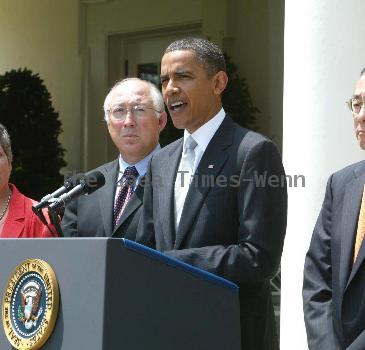Democratic incumbents in Pa. and Ark. face challenges; tea party looks to Kentucky
By David Espo, APTuesday, May 18, 2010
Primaries test incumbents’ durability, tea party
WASHINGTON — Democrats Arlen Specter in Pennsylvania and Blanche Lincoln in Arkansas struggled uncertainly for nomination to new Senate terms Tuesday and tea party activists clashed with the Republican hierarchy in Kentucky in primaries testing anti-establishment anger in both political parties.
In a fourth race with national implications, Republican Tim Burns and Democrat Mark Critz vied to fill out the final few months in the term of the late Rep. John Murtha in southwestern Pennsylvania.
Each political party invested nearly $1 million to prevail for that House seat and said the race to succeed the longtime Democratic lawmaker was something of a bellwether for the fall.
Rounding out the busiest night of the primary season to date, Democratic Sen. Ron Wyden in Oregon faced little opposition in his campaign for nomination to a third full term.
Voters in Pennsylvania and Oregon also selected gubernatorial candidates.
The first few hundred votes of the night were counted in Kentucky, where Rand Paul, supported by tea party activists, took an early lead over Secretary of State Trey Grayson for the Republican Senate nomination.
Lt. Gov. Daniel Mongiardo led Attorney General Jack Conway for the Democratic nomination.
The far-flung races took place a little less than five months before midterm elections in which Republicans will challenge Democrats for control of both houses of Congress. President Barack Obama backed incumbents in his party’s races, but despite the stakes for his legislative agenda the White House insisted he was not following the results very closely.
Whatever the fate of the parties, public opinion polls — and the defeat of two veteran lawmakers in earlier contests — already had turned the campaign into a year of living dangerously for incumbents.
High unemployment, an economy just now emerging from the worst recession in generations and Congress’ decision to bail out Wall Street giants in 2008 all added to voters’ unease, polls said. In a survey released shortly before the polls closed, ABC said voter expectations for the economy had turned optimistic for the first time in six years. At that, only 33 percent of those polled said so in the network’s polling, compared with 29 percent saying the opposite.
Sen. Bob Bennett of Utah, a conservative judged not sufficiently so by tea party activists and other critics, was denied a spot on the primary ballot earlier this month in his state. He has flirted with running as a write-in but has not yet announced any plans.
In West Virginia, Democratic Rep. Alan Mollohan fell in a primary to an opponent who highlighted ethics issues.
Tuesday’s Kentucky primary pitted Paul, a political novice who generated tea party support, against Grayson, recruited by the state’s senior senator, U.S. Senate Republican leader Mitch McConnell.
Former Alaska Gov. Sarah Palin backed Paul, as did Sen. Jim DeMint, a South Carolinian who has waded into several primaries in hopes of pushing his party to the right.
In Kentucky’s Democratic primary, Lt. Gov. Daniel Mongiardo and Attorney General Jack Conway collided for a spot on the ballot in the fall.
Specter dueled with Rep. Joe Sestak in Pennsylvania, an 80-year-old party-switching veteran against a younger opponent in a frequent swing state in national campaigns.
Specter sought his sixth term, and first in his new party. Sestak tagged him as an opportunist, airing an ad that showed Specter saying he had abandoned the Republican Party so he could win re-election.
“Politicians are like diapers. They both should be changed regularly,” Marc Coleman 41, of Philadelphia, said as he cast his vote.
But across the state in Pittsburgh, Stephen Little, 48, said he sided with the incumbent. “He’s been there so long, he’s familiar with all the areas and information,” he said.
Former Rep. Pat Toomey had little opposition in his bid for the Republican nomination in Pennsylvania.
In Arkansas, Lincoln’s primary foe was Lt. Gov. Bill Halter in a race that took on trappings of a clash of outside interests. Records on file with the Federal Election Commission showed outside groups had spent nearly $10 million to sway the outcome.
Lincoln positioned herself as an independent-minded Democrat not beholden to her party. Halter’s campaign was backed by labor unions unhappy with Lincoln’s opposition to a government option under health care, legislation making it easier for unions to organize and trade legislation. Little Rock businessman D.C. Morrison also ran.
Among Republicans, Rep. John Boozman took on eight lesser-known rivals for party nomination to the Senate.
Arkansas state law provides for a primary runoff on June 8 if no one achieves a majority.
In Oregon, Republicans chose among seven contenders for the nomination to oppose Wyden.
Also in Oregon, former Democratic Gov. John Kitzhaber campaigned for his party’s nomination for a return to office, and nine Republicans competed for the right to run against him.
In Pennsylvania’s gubernatorial primary, four Democrats and two Republicans vied for spots on the November ballot.
As if primaries weren’t enough, both parties had other concerns.
Rep. Mark Souder, a conservative Republican from Indiana, abruptly announced he would resign on Friday, admitting he had had an affair with a woman on his congressional payroll. Democrats said his resignation would make the seat competitive in the fall.
And Democrat Richard Blumenthal, the Connecticut attorney general running for the Senate, disputed a newspaper report that he once lied about his Vietnam record. Republicans focused on the report, hoping it would increase their chances of winning the seat.
_____
Associated Press writers Susan Haigh in Connecticut and Tom Davies and Deanna Martin in Indiana contributed to this report.
Tags: Arkansas, Arlen specter, Barack Obama, Blumenthal, Campaigns, Conway, Kentucky, Mark souder, North America, Oregon, Pennsylvania, Political Organizations, Political Parties, Political Resignations, Primary Elections, Richard blumenthal, Sarah palin, Souder, United States, Washington










